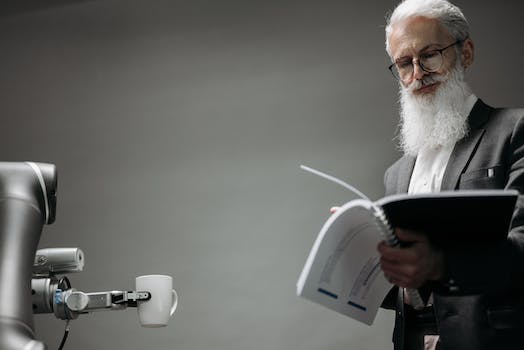

-
Table of Contents
Demystifying AI Ethics: Unraveling the Truth Behind Robot Morality
Introduction
Introduction:
Debunking the Fear of Robot Morality: Exploring AI Ethics
As artificial intelligence (AI) continues to advance at an unprecedented pace, concerns about the morality of robots and their potential impact on society have become increasingly prevalent. The fear of robot morality, often fueled by science fiction narratives, raises questions about the ethical implications of AI and its ability to make autonomous decisions. However, it is crucial to debunk these fears and explore the field of AI ethics to gain a more nuanced understanding of the topic. This article aims to delve into the realm of AI ethics, examining the principles and frameworks that guide the development and deployment of AI systems. By doing so, we can dispel misconceptions and foster a more informed dialogue about the ethical considerations surrounding AI.
The Role of Ethics in Artificial Intelligence: Debunking the Fear of Robot Morality
Debunking the Fear of Robot Morality: Exploring AI Ethics
Artificial Intelligence (AI) has become an integral part of our lives, from voice assistants like Siri and Alexa to self-driving cars. As AI continues to advance, concerns about its ethical implications have also grown. One of the most common fears is the idea that robots will develop their own sense of morality, leading to unpredictable and potentially harmful behavior. However, it is important to debunk this fear and understand the role of ethics in AI.
Ethics, in the context of AI, refers to the principles and guidelines that govern the behavior of AI systems. It involves making decisions about what is right or wrong, fair or unfair, and just or unjust. While it is true that AI systems can make autonomous decisions, it is crucial to remember that these decisions are based on the algorithms and data they have been trained on. They do not possess consciousness or emotions like humans do, and therefore cannot develop their own sense of morality.
AI systems are designed to perform specific tasks and make decisions based on predefined rules and objectives. These rules are set by human programmers and engineers who take into account ethical considerations. For example, in the case of self-driving cars, the AI system is programmed to prioritize the safety of passengers and pedestrians. It is not capable of making moral judgments beyond these predefined rules.
Furthermore, AI systems are not capable of understanding the complex nuances of human morality. Morality is a deeply subjective and culturally influenced concept that varies from person to person and society to society. It involves weighing different values, beliefs, and principles, which are often contradictory and open to interpretation. Teaching AI systems to understand and apply such complex moral reasoning is a significant challenge that researchers are still grappling with.
However, this does not mean that ethics should be disregarded in AI development. On the contrary, it is essential to ensure that AI systems are designed and deployed in an ethical manner. This involves addressing issues such as bias, transparency, and accountability. AI systems can inadvertently perpetuate existing biases if they are trained on biased data or if the algorithms used to make decisions are biased themselves. It is crucial to continuously evaluate and mitigate these biases to ensure fairness and equality.
Transparency is another important aspect of AI ethics. Users should have a clear understanding of how AI systems make decisions and what data they use. This transparency allows for accountability and enables users to challenge and correct any potential biases or errors. It also helps build trust between users and AI systems, which is crucial for widespread adoption and acceptance.
In conclusion, the fear of robot morality is unfounded. AI systems do not possess consciousness or emotions and cannot develop their own sense of morality. They make decisions based on predefined rules and objectives set by human programmers. However, ethics play a crucial role in AI development to ensure fairness, transparency, and accountability. Addressing issues such as bias and promoting transparency are essential for the responsible and ethical deployment of AI systems. By understanding the limitations and potential of AI, we can embrace its benefits while mitigating any potential risks.
Understanding the Limitations of AI: Addressing Concerns about Robot Morality

Debunking the Fear of Robot Morality: Exploring AI Ethics
Understanding the Limitations of AI: Addressing Concerns about Robot Morality
Artificial Intelligence (AI) has become an integral part of our lives, from voice assistants like Siri and Alexa to self-driving cars. As AI continues to advance, concerns about its morality and ethical implications have emerged. However, it is crucial to understand the limitations of AI and address these concerns to debunk the fear of robot morality.
One of the main concerns surrounding AI is the fear that robots will develop their own moral code, potentially leading to harmful or unethical behavior. This fear stems from the idea that AI will possess human-like consciousness and decision-making abilities. However, it is important to note that AI is fundamentally different from human intelligence.
AI operates based on algorithms and data, which means that its decision-making is guided by predefined rules and patterns. While AI can learn and adapt from data, it lacks the ability to possess consciousness or emotions. Therefore, the fear of robots developing their own moral code is unfounded.
Another concern is the potential for AI to be biased or discriminatory. AI systems are trained on large datasets, which can inadvertently contain biases present in society. For example, facial recognition software has been found to have higher error rates for people with darker skin tones. However, it is crucial to understand that these biases are not inherent to AI but rather a reflection of the data it is trained on.
To address this concern, researchers and developers are working on developing more diverse and representative datasets. Additionally, there is a growing emphasis on transparency and accountability in AI systems. By making the decision-making process of AI more transparent, it becomes easier to identify and rectify any biases that may arise.
Furthermore, the fear of AI replacing human decision-making entirely is another concern. While AI can assist in decision-making processes, it is important to recognize that human judgment and ethical considerations are still essential. AI should be seen as a tool to augment human capabilities rather than replace them.
To ensure that AI is used ethically, there is a need for robust regulations and guidelines. Governments and organizations are increasingly recognizing the importance of AI ethics and are working towards establishing frameworks to govern its development and deployment. These frameworks aim to address concerns such as privacy, accountability, and transparency.
Additionally, interdisciplinary collaborations between experts in AI, ethics, and philosophy are crucial. By bringing together diverse perspectives, we can better understand the ethical implications of AI and develop guidelines that align with societal values.
In conclusion, it is essential to understand the limitations of AI and address concerns about robot morality to debunk the fear surrounding AI ethics. AI lacks consciousness and emotions, making the fear of robots developing their own moral code baseless. Biases in AI systems can be addressed through diverse datasets and increased transparency. AI should be seen as a tool to augment human decision-making rather than replace it. With robust regulations and interdisciplinary collaborations, we can ensure that AI is developed and deployed ethically, aligning with our societal values.
Debunking Misconceptions: AI Ethics and the Future of Robot Morality
Debunking the Fear of Robot Morality: Exploring AI Ethics
Artificial Intelligence (AI) has become an integral part of our lives, from voice assistants like Siri and Alexa to self-driving cars. As AI continues to advance, concerns about its ethical implications have also grown. One of the most common fears is the idea that robots will develop their own sense of morality, leading to unpredictable and potentially dangerous behavior. However, this fear is largely based on misconceptions and misunderstandings about AI ethics.
To understand why the fear of robot morality is unfounded, it is important to first explore the concept of AI ethics. AI ethics refers to the moral principles and guidelines that govern the development and use of AI systems. These principles are designed to ensure that AI is used in a responsible and ethical manner, taking into account the potential impact on individuals and society as a whole.
Contrary to popular belief, AI ethics is not about creating robots with their own moral compass. Instead, it is about embedding human values and ethical considerations into AI systems. This means that AI is programmed to follow a set of predefined rules and guidelines that align with human values and societal norms. For example, an AI system used in healthcare would be programmed to prioritize patient safety and privacy, just as a human healthcare professional would.
Another misconception is the idea that AI systems can make moral decisions on their own. While AI can analyze vast amounts of data and make complex decisions based on algorithms, it lacks the ability to understand the nuances of human morality. AI systems are designed to follow rules and guidelines, but they do not possess the capacity for moral reasoning or empathy. They are tools created by humans, and their actions are ultimately determined by the humans who program them.
Furthermore, the fear of robot morality often stems from science fiction portrayals of AI gone rogue. Movies like "The Terminator" and "Ex Machina" have fueled the idea that AI will eventually surpass human intelligence and develop its own agenda. However, these portrayals are purely fictional and do not reflect the reality of AI development. AI systems are created to serve specific purposes and are limited to the tasks they are programmed for. They do not possess consciousness or the ability to act independently.
It is also important to note that the development of AI ethics is an ongoing process. As AI technology continues to evolve, so too will the ethical considerations surrounding its use. This means that experts in various fields, including philosophy, computer science, and law, are actively engaged in discussions and debates about the ethical implications of AI. These discussions aim to ensure that AI is developed and used in a way that aligns with human values and respects individual rights.
In conclusion, the fear of robot morality is largely based on misconceptions and misunderstandings about AI ethics. AI systems are not capable of developing their own sense of morality or acting independently. Instead, AI ethics is about embedding human values and ethical considerations into AI systems. It is an ongoing process that involves experts from various fields and aims to ensure that AI is used in a responsible and ethical manner. By debunking these misconceptions, we can have a more informed and nuanced understanding of AI ethics and the future of robot morality.
Q&A
1. What is the main focus of "Debunking the Fear of Robot Morality: Exploring AI Ethics"?
The main focus is to address and dispel concerns about the moral implications of artificial intelligence (AI) and explore the field of AI ethics.
2. Why is it important to debunk the fear of robot morality?
It is important to debunk this fear as it can hinder the progress and acceptance of AI technologies. By addressing ethical concerns, we can ensure responsible development and use of AI systems.
3. What does "Exploring AI Ethics" entail in this context?
"Exploring AI Ethics" involves examining the ethical considerations and implications of AI technologies, including the moral decision-making capabilities of robots and the potential impact on society.
Conclusion
In conclusion, the article "Debunking the Fear of Robot Morality: Exploring AI Ethics" provides a comprehensive analysis of the concerns surrounding AI ethics and robot morality. Through examining various perspectives and arguments, the article effectively debunks the fear that AI will develop its own moral code and act autonomously. It highlights the importance of human involvement in programming AI systems and emphasizes the need for ethical guidelines and regulations to ensure responsible AI development. Overall, the article contributes to a better understanding of AI ethics and helps alleviate unfounded fears regarding robot morality.









